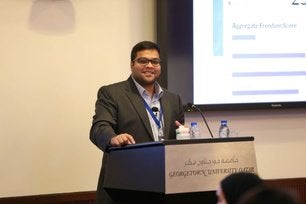Student Engagement
CURA Workshop: The Art of Hearing and Seeing Data

On October 10, 2019, CIRS hosted a CURA workshop titled, “The Art of Hearing and Seeing Data: Introduction to Qualitative Research Methods,” by Assistant Professor of Government at GU-Q, Dr. Uday Chandra. The workshop provided participants with an insightful breakdown of the practical fundamentals of qualitative research and data observation. Ranging from freshmen to seniors, the participants actively engaged with the material and discussions led by Prof. Chandra, enabling them to build upon each other’s interpretations of the significance of plausible data across various forms of qualitative research. Through a simple ethnography-inspired observation exercise that students were required to complete prior to the workshop, students were able to contextualize the role of hearing and seeing data at the most rudimentary level, within the overarching theme of conducting qualitative research. As part of the discussion, students compared the sights and sounds they observed in public spaces at various campuses, in comparison with the audio-visual elements of the social atmosphere at the atrium in GU-Q itself, and explored the interactions between independent variables such as academic concentrations and gender ratios.
The workshop initially delved into the basics of quantitative and qualitative research, emphasized that each method has shortcomings, and can be used only to answer certain, specific research questions. Recognizing the “seduction of quantification” and the difficulty of demonstrating causation, not just correlation, and to accurately reflect social reality, enabled participants to contextualize the role of qualitative research methods within the wider framework of data observation. Prof. Chandra also highlighted the pitfalls of qualitative research in its inability to identify macro trends, geospatial mapping of micro-level data, establish patterns for large numbers of cases or variables, or even solve existential problems. Students learned that different methodological approaches should be used to strengthen the certainty of their theses.
Prof. Chandra used a personal example of his doctoral research titled, “Negotiating Leviathan: State-making and Resistance in the Margins of Modern India,” to demonstrate the practical workings of qualitative research. He shared his own experience in overcoming challenges pertaining to fieldwork. Salma Hassabou, CURA Administrative Fellow and workshop participant, commented, “I thoroughly enjoyed listening to Prof. Chandra’s personal experience with qualitative research because much of what we study is mostly theoretical in nature that not everyone knows how to apply it in practical research. The example he shared regarding his fieldwork tied the entire workshop together, and I found it incredibly helpful.”
The workshop also addressed concerns regarding the importance of credible research design and the need for a focused research question. The conversational nature of the workshop also allowed students to engage with the topic very closely and clarify areas of ambiguity within the spheres of both qualitative and quantitative research methods.
The workshop had a total of twenty-four participants, and the attendees who successfully completed all required tasks were awarded electronic badges to certify their enrollment and completion of this CURA workshop. CIRS hosts CURA workshops once every semester to encourage student research and to equip the GU-Q student body with the skills and practical knowledge needed to produce original research in the students’ respective fields of interest.
Article by Irene Promodh (class of 2021), CURA Research Fellow